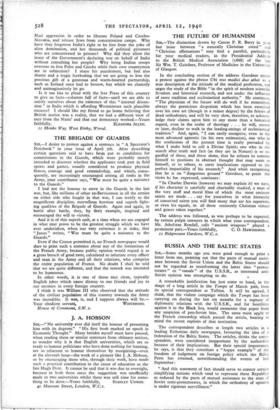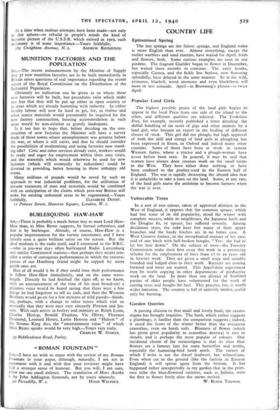RUSSIA AND THE BALTIC STATES
SIR,—Some months ago you were good enough to print a letter from me, pointing out that the pacts of mutual assist- ance between the Soviet Union and the Baltic States should not be regarded as transforming the latter into " protec- torates " or " vassals " of the U.S.S.R., as interested anti- Soviet opinion was attempting to do.
A remarkable justification has just come to hand, in the shape of a long article in the Temps of March 30th, from its special correspondent at Tallinn. It will be agreed, I think, that the violent campaign which the Temps has been carrying on during the last six months for a rupture of diplomatic relations with the U.S.S.R., and for hostilities against it in the Black Sea, would exonerate that paper from any suspicion of pro-Soviet bias. The same must apply to the French censorship which passed the article, bearing in mind the recent exploits of that institution.
The correspondent describes at length two articles in a leading Esthonian daily newspaper, favouring the idea of a federation of the Baltic States. The articles, thinks the corre- spondent, were considered inopportune by the authorities because of their implications. But their special importance, he says, is that they constitute a "happy example" of the freedom of judgement on foreign policy which the Baltic Press has retained, notwithstanding the events of last September :
"And this statement of fact should serve to correct certain simplifying notions which tend to represent these Republics as reduced by the pacts of mutual assistance to the state of Soviet semi-protectorates, in which the orthodoxy of opinion is under rigorous surveillance." At a time when zealous attempts have been made—not only in this sphere—to rebuild in people's minds the kind of fantastic picture of the U.S.S.R. which existed in 1919, such testimony is of some importance.—Yours faithfully,
263 Creighton Avenue, N. z. ANDREW RcrrHsTEIN.



































 Previous page
Previous page